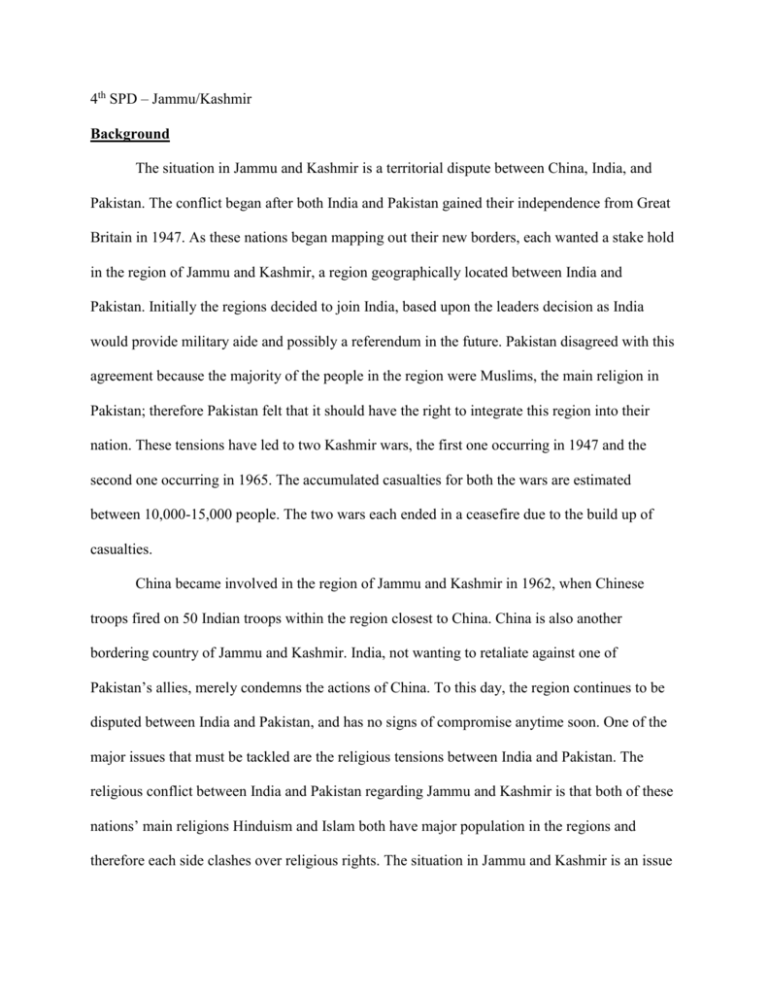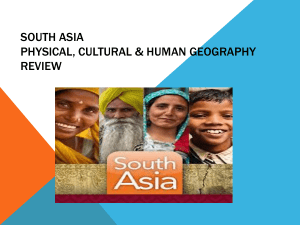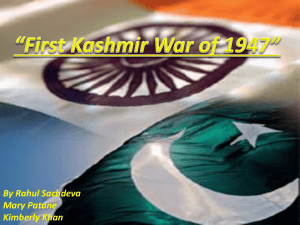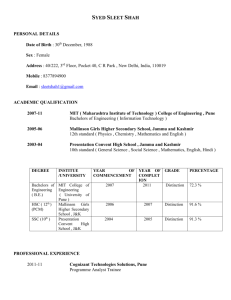4th SPD – Jammu/Kashmir
advertisement

4th SPD – Jammu/Kashmir Background The situation in Jammu and Kashmir is a territorial dispute between China, India, and Pakistan. The conflict began after both India and Pakistan gained their independence from Great Britain in 1947. As these nations began mapping out their new borders, each wanted a stake hold in the region of Jammu and Kashmir, a region geographically located between India and Pakistan. Initially the regions decided to join India, based upon the leaders decision as India would provide military aide and possibly a referendum in the future. Pakistan disagreed with this agreement because the majority of the people in the region were Muslims, the main religion in Pakistan; therefore Pakistan felt that it should have the right to integrate this region into their nation. These tensions have led to two Kashmir wars, the first one occurring in 1947 and the second one occurring in 1965. The accumulated casualties for both the wars are estimated between 10,000-15,000 people. The two wars each ended in a ceasefire due to the build up of casualties. China became involved in the region of Jammu and Kashmir in 1962, when Chinese troops fired on 50 Indian troops within the region closest to China. China is also another bordering country of Jammu and Kashmir. India, not wanting to retaliate against one of Pakistan’s allies, merely condemns the actions of China. To this day, the region continues to be disputed between India and Pakistan, and has no signs of compromise anytime soon. One of the major issues that must be tackled are the religious tensions between India and Pakistan. The religious conflict between India and Pakistan regarding Jammu and Kashmir is that both of these nations’ main religions Hinduism and Islam both have major population in the regions and therefore each side clashes over religious rights. The situation in Jammu and Kashmir is an issue for the international community because both India and Pakistan contain nuclear weapons, and therefore must be treated with caution. Additionally in order to protect the civilians in the region of Jammu and Kashmir from more violence, communication between India and Pakistan must progress in order to maintain and control the situation in the region. United Nations In 1948 the United Nations created the United Nation Commission for India and Pakistan (UNCIP). The UNCIP goal is to monitor the area in Jammu and Kashmir in hopes of finding a solution. The UNCIP is the main proponent in helping form resolutions for India and Pakistan regarding Jammu and Kashmir. The UN has passed a total of sixteen resolutions to this date through the UNCIP. In 1949 the United Nations Military Observer Group for India and Pakistan (UNMOGIP) was created. The UNMOGIP was created in order to maintain the ceasefire from the first Kashmir War. It was also created to protect the civilians in the region from outbreaks of war that could threaten the civilians’ safety. Currently there are 44 military observers in the region of Jammu and Kashmir; these observers are simply monitors from different nations around the world, who observe the military aspect of the conflict and create solutions that will ensure peace in the region. In 1971 the UN passed Security Council Resolution 307, which calls for the reduction of violence in the region as well as promote humanitarian aide to the region. This resolution has been the guidelines for all activities made by the UN in the region. The main activities that the UN has done through this resolution have been humanitarian since the UN does not promote violence. The UN has been a main advocate of opening dialogue between the two sides in hopes of reducing the tensions between the two nations. In a sense China’s involvement in the dialogue is not valued as much as India and Pakistan, seeing as how the main issue regarding the territorial dispute has been between the two nations and their religious tensions. Multilateral peace talks have also been proposed though did not progress as much as the UN had hoped due to very little cooperation between India and Pakistan. The UN however, continues to stress the issue of Jammu and Kashmir and hopes that the current situation will improve and that violence will not outbreak again. Solutions One of the major short term solutions the international community hopes to improve is the humanitarian aid. The international community wants to see that the humanitarian aid sent is actually being received by the refugee camps, and from there used appropriately in order to treat the patients in the camps that have been wounded and displaced due to the conflict. Ensuring that the aid is being used properly will go along way in keeping the civilians in the region safe. Sending in humanitarian aid is the quickest way to help the civilians in the region while peace talks progress. This goes along with the UN’s goal of improving the UNHCR refugee camps; it would allow for more adequate equipment and supplies to treat the refugees. Furthermore, the international community wants to address transportation for refugees. Using the donations worldwide, transporting the refugees from areas where no treatment is available to the locations where the camps are will further ensure security and safety for the civilians. The entire world continues to stress the importance of opening dialogue between the two nations India and Pakistan. Proposing multilateral talks with the UN as a mediator has been rejected multiple times. Some incentives have been offered in the past such as financial assistance but no proper agreement has resulted. The international community’s most recent activity is the added pressure onto India and Pakistan to try and find a common line a compromise to the territorial dispute. Questions to Consider What is China’s role in the current situation? Should the civilians in Jammu and Kashmir have a say in what is going on? Is their an effective way to reduce religious tension between India and Pakistan? Should other nations have a say in the territorial disputes of the region? Without using military force or choosing sides is their anything the UN and international community can do to create progress? Aside from humanitarian aid is there any other solution that can effectively help this conflict? Works Cited <http://www.opinion-maker.org/2011/02/kashmir-the-essence-of-the-uncip-resolutions/>. <http://www.cidob.org/en/publications/opinion/asia/foreign_assistance_unwelcome_in_china_in dia_boundary_conflict>. <http://unhcr.org/refworld/topic,463af2212,469f2dcf2,487ca21a2a,0.html>. <http://www.un.org/en/peacekeeping/missions/unmogip/background.shtml>.




